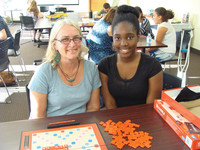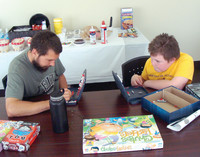“How do you tally improving a kid’s life? How can you put a number to helping them grow into successful adults?” Katje Afonseca, executive director of Big Brothers Big Sisters of the Ocean …
This item is available in full to subscribers.
We have recently launched a new and improved website. To continue reading, you will need to either log into your subscriber account, or purchase a new subscription.
If you are a current print subscriber, you can set up a free website account by clicking here.
Otherwise, click here to view your options for subscribing.
Please log in to continue |
|


“How do you tally improving a kid’s life? How can you put a number to helping them grow into successful adults?” Katje Afonseca, executive director of Big Brothers Big Sisters of the Ocean State (BBBSOS) asked. “You can’t report these numbers, but you can tell the story of how mentors broke down walls and gave their mentees confidence.”
The organization celebrates its 50th anniversary this year, incorporating the milestone in all their events.
BBBSOS has also partnered with Alex & Ani and has developed matching bracelets featuring the Big and Little Dippers representing their mentoring pairs. BBBSOS receives a portion of the proceeds nationwide to help foster mentoring pairs.
Dr. Dorothy Pieniadz began Big Sisters of Rhode Island in 1966 with the help of Zonta International after hearing about a similar organization, helping underprivileged girls in another state. Initially, the organization only worked with young girls across the state, beginning to service boys in 2010. Currently, BBBSOS serves 500 youth throughout the state and has around 200 children on their waiting list.
Over the past 50 years, the organization has transitioned, not only in how they operate, but also their mentor demographics and the issues mentees face day in and day out.
When the organization began, Afonseca explained, the majority of mentors were women, stay-at-home mothers, but after the “social shift” where women began entering the workforce, men also stepped up seeing mentoring as something “they could and should do.”
Volunteers began to dwindle and the non-profit saw more young professionals and retirees, but it was hard to recruit individuals in that “middle section” working and most likely with children of their own. To bring in a broader demographic the nonprofit began and continues to begin new initiatives.
To address this, the organization began offering additional mentoring opportunities to be more accessible to potential mentors and working professionals. One program BBBSOS pioneered is the Beyond School Walls program, which partnered with Amgen to transport mentees to the offices once a week to meet onsite. The STEM based program brought in 20 volunteers to work with students on science projects, with a culminating science fair to showcase the projects.
Also for those who may be a bit more apprehensive about mentoring or have hectic schedules, there is a site based mentoring where mentoring pairs, fondly called bigs and littles in BBBSOS, meet in a group rather than one on one.
The more accessible mentoring is, the more youth the organization can benefit, but Afonseca said although BBBSOS wants to help all the children they can, “quality relationships is always the first and foremost concern. We want to make each pair feel like there are our number one priority by making sure our services are designed around the pairs.”
Fifty years ago, when Big Sisters began, the children they were dealing with were really the first generation of youth dealing with divorce, that needed an adult aside from their parents to turn and talk to.
“We will always have kids to serve, it is just that their needs as mentees may change over time and we have to be prepared to deal with that,” Afonseca said
She said that now more than ever parents are very forthcoming with the issues a child may be facing at home, such as previous abuse, but one growing concern is bullying. Although bullying has always been a concern, before the rise of the Internet, students could go home and be immersed in a completely difference environment. Now, though with cyber bullying the issues follow students home.
“It is everywhere it’s all consuming,” Afonseca said. “Our mentors are trained to spot the signs of a child who may be being bullied because it is a growing problem with our youth.”
Bullying isn’t the only training bigs receive. BBBSOS is completely “revamping” their training procedures, looking for input from their mentors as to what they are facing in their pairs.
One area in which mentors will be receiving more training is in identifying the signs of a child who is being trafficked. About 75 percent of the youth BBBSOS serves is at or below the poverty level, Afonseca said, and that is a highly targeted demographic for traffickers, who are living in single parent homes and need money or food.
“Trafficking may have been happening years ago, but not at the level we are seeing now,” Afonseca said.
Especially since this “Z generation” is so tuned into the internet, almost a dependency, Afonseca said many children have difficulty connecting with others on a personal level, one on one. Mentoring is helping today’s youth more than ever build a foundation of soft social skills by developing a connection to another person.
“I was looking for someone nice I could turn to for advice, who would be easy to talk to and wouldn’t judge me,” Caira, a 16-year-old little, said. “Debbie-Jo and I have gotten close over the last year.”
Caira’s has been paired with her big, Debbie-Jo Horton, for more than a year now and said she has learned a lot about herself in the process, about how she can do things in her life differently.
Horton also said she had benefited greatly from the mentoring relationship; she gets a different perspective, a “fresh look” on things.
“I don’t feel like a grandmother, I feel like a trusted advisor and friend. A lot has changed since I was 16 and it is interesting to see what has remained the same, but all the things that are different,” Horton said. “There is just so much pressure on kids today. They are faced with issues I didn’t even come in contact with until my late 20’s.”
For Caira, Horton is another adult figure in her life, that isn’t “obligated” to say certain things, but can explain adult decisions from a different point of view than say her mother.
Caira also said she is able to do things she wouldn’t otherwise. For example Horton took Caira to the Southwick Zoo and they were able to see her favorite animal, elephants, up close and personal because Horton knows the owners.
“I wasn’t expecting that. There are so many little thing we do together, but they mean so much to me,” Caira said.
Horton encouraged other to become a mentor themselves, especially if time was the only barrier. She herself used to think she didn’t have the time to be a mentor, but quickly found once she volunteered that it was easy to make time to meet with Caira regularly.
Afonseca said growing up kids have so many people telling them what to do in life, parents, teachers, coaches, but a mentor is someone who can show them how it is done and be there for advice and support.
“It is important kids have someone in their lives with more life experience that will talk to them like a human being that a child can look to as a role model,” Afonseca said. “Our mentors can take children away and out of what they are used to and expose them to something new which can create a monumental shift in their lives towards something better.”
Comments
No comments on this item Please log in to comment by clicking here